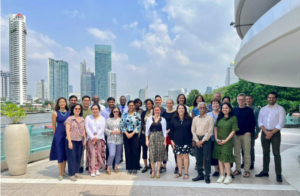
Last year, Dr. Kym Weed, a co-director of HHIVE, joined a Global Convening Program funded by The British Academy to examine current approaches to antimicrobial resistance (AMR). This interdisciplinary team, known as the Just Transitions for AMR Working Group, utilizes a “just transition” framework that prioritizes the consideration of worldwide equity when it comes to future policy-making decisions on AMR by consulting a range of scholars with different specialties.
Dr. Weed was approached by Dr. Sonia Lewycka, a leading member of the project and epidemiologist at the Oxford University Clinical Research Unit in Hanoi, Vietnam, due to her previous research on narratives and discourses surrounding microbiology. The group first convened in London in March 2023, where Dr. Weed met with other members of the project to collaborate on the conceptual background of antimicrobial resistance. Building on that initial meeting, the group published a comment in the Lancet where they outlined the need for a just transitions approach to antimicrobial resistance. Dr. Weed traveled to Bangkok, Thailand in February for the group’s third in-person meeting.
Why AMR?
Antimicrobial resistance is a natural process, or “an evolutionary inevitability for [microbes] survival” (Lancet), that is fueled by competition amongst microorganisms. When microorganisms are exposed to antimicrobials designed to kill them, some survive as a result of random mutations. These “resistant” microbes then pass their naturally selected genes onto their offspring, increasing the number of organisms in the population that do not respond to that antimicrobial. As a result of antimicrobial resistance, many infections have become unresponsive to the antibiotics that have been used to treat them for years, and infections that were once thought of as “common” are growing increasingly harder to treat (WHO).
Though antimicrobials are a key tool in fighting disease, they also drive resistance and create untreatable diseases, leading some policy makers to propose tighter restrictions on antibiotic use. The Just Transitions for AMR Working Group tasks those same policy makers to consider the ways that these restrictions can aggravate pre-existing socio-economic disparities. For example, restricting access to over-the-counter (OTC) antibiotics in low- and middle-income countries where people have less access to doctors or affordable alternatives denies some of the most vulnerable populations access to one of the major constituents of their healthcare.

This paradox is one example of what the Lancet comment refers to as the “access-excess tradeoff,” which addresses the fine line between providing affordable access to healthcare while ensuring that the over prescription of antibiotics does not worsen AMR. In another example, consider the livestock market. Farmers use antimicrobials to keep animals healthy and increase their profits. Any policy change that restricts the use of these antimicrobials would prevent “excess” use but also hurt the profit margins of smaller farms more significantly than larger farms, thus further complicating current socioeconomic issues. As the Lancet comment notes, “Individuals operating on razor-thin margins absorb greater risks of economic collapse if they are unable to use antibiotics [on their livestock].” This example highlights the potential for a loss of access (as farmers will lose their livelihood) in an attempt to diminish excess (in an attempt to lower antimicrobial use), but also demonstrates the current barriers when it comes to legislative solutions.
The world is faced with a collective action problem, where the obvious solution seems to be “just use less antibiotics,” but it’s not that simple.
Multiple Perspectives for a Multifaceted Problem
The Just Transitions for AMR team hopes to intervene by developing a framework that strikes the difficult balance between eliminating excess while still preserving access. The research aims to investigate and characterize the current drivers of antimicrobial resistance in order to inform legislative and healthcare policies. Researchers on the project must be able to analyze the structural implications of this problem from a variety of perspectives to assess the complex tradeoffs involved in AMR governance and ensure the costs of mitigation policies are not disproportionately shouldered by one group or another.
Thus, this research team draws its strength from its interdisciplinarity: the participating scholars have come together from a range of organizations around the world and work in fields as varied as epidemiology, ethics, legal studies, science communication, policy, economics, etc. This crosstalk between various fields and geographic locations facilitates the development of a multifaceted solution that can work to alleviate the many nuanced problems associated with antimicrobial resistance. Just Transitions is about combining the expertise of many in order to propose a solution that works for all.
This is where Dr. Weed and the HHIVE Lab enter the picture. Dr. Weed’s role in the project is to examine the narrative framework that surrounds antimicrobial resistance and human-microbe interactions in contemporary works of fiction, journalism, and scientific research. Several students within HHIVE have already been assisting Dr. Weed by compiling different types of media that discuss antimicrobial resistance, in forms ranging from academic research to science fiction novels. The team will identify patterns in the language and explore the impacts those patterns have on potential interventions. Dr. Weed’s goal is to facilitate a reorientation of the way we talk about AMR.
At the end of the day, the Lancet comment is significant for the Just Transitions for Antimicrobial Resistance project because it is vocalizing an issue that has persisted since antibiotics were discovered in the first place and that will continue to persist without the implementation of justice-oriented interventions. Dr. Weed said it best in an interview about AMR: “It is already happening. It will continue to happen. It doesn’t mean there’s not things we can do about it.”
For more information on The British Academy project, click here. To view the Lancet comment, click here.
 Isabel Kakacek is an Undergraduate Student, completing her BA in Medical Anthropology and English & Comparative Literature with a concentration in Medicine, Literature, and Culture.
Isabel Kakacek is an Undergraduate Student, completing her BA in Medical Anthropology and English & Comparative Literature with a concentration in Medicine, Literature, and Culture.
 Emma Bryson is an Undergraduate Student completing her BS in Psychology and also completing a double major in Hispanic Studies.
Emma Bryson is an Undergraduate Student completing her BS in Psychology and also completing a double major in Hispanic Studies.
 Sophia Vona is an Undergraduate Student completing her BS in Biology and BA in English (Literature, Medicine, and Culture) with a Minor in Chemistry.
Sophia Vona is an Undergraduate Student completing her BS in Biology and BA in English (Literature, Medicine, and Culture) with a Minor in Chemistry.

